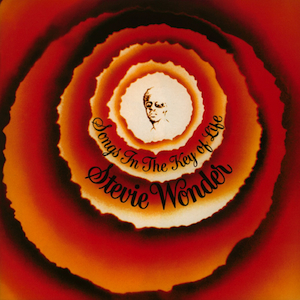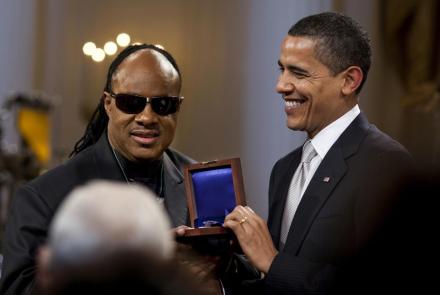Stevie Wonder is my favorite music-industry artist of all-time. He's been active for over 60 years now, and honestly speaking, I don't know if I'll ever get around to listening to his entire discography. However, I have heard most of his studio albums, and I don't think that many people realize how dominant Stevie was during his heyday of the mid-1970s.
For instance, he won Grammys for Album of the Year three times within of four years (in 1974, '75 and '77) which, as far as I know, is a feat that no other musician has ever replicated. And from what I can gather, it wasn't one of those situations like nowadays when someone wins a Grammy, and other musicians start beefing like they don't deserve it. For example, it was the legendary Paul Simon who took home Album of the Year in 1976 for a project he dropped called Still Crazy After All These Years. And in accepting the award, he actually stated "I'd like to thank Stevie Wonder, who didn't release an album this year."
 |
| The cover of 1976's Song in the Key of Life, Stevie Wonder's signature work. |
That 1977 Grammy that Stevie won was for Songs in the Keys of Life, which is unanimously considered to be his signature work. It is also a double LP, and all things considered there are other songs from it that would have been a lot easier to research. But I decided to go with a relatively-obscure track found therein, Summer Soft, as sometimes I feel like it is my favorite Stevie Wonder song. Actually, it is so obscure that - combined with the fact that Keys of Life came out a good time before the internet age - information on it is basically nonexistent. So what I'm rather doing in this post for the most part is celebrating it.
What is readily known fact-wise is that Stevie wrote and produced this track himself and also played about half of the instruments. And that's one of the reasons why no one could f*ck with him back in his days, because he could not only envision a deep song but also, largely by his own hand, bring it into existence. And one other participant on the track who at least has his own Wikipedia page is organist Ronnie Foster, who dropped a studio album (Reboot) as recently as 2022.
The reason I like Summer Soft so much is because on the surface it sounds like a love song. But if you listen to it enough times, you'll realize that it's actually a war song. Or, have you ever heard that saying that 'all's fair in love and war'? To me these lyrics, in addition to how they are relayed, depict the similarities between those two phenomena, how the euphoria of being smitten can be effectively counteracted through the pain of abandonment.
As far as the title goes, it alludes to the fact that Stevie uses references to the seasons to get his point across. Or as interpr by Genius, this "song captures the fleeting feelings of love and excitement as embodied by the changing seasons of the year". I've heard other musicians try the same thing, i.e. using the seasons as metaphors, but none come close to doing so as effectively as Wonder does on this track, though Lil Wayne, an exceptional lyricist in his own right, did an admirable job on Mr. Carter (2008). But I don't want to delve too deeply into the lyrics Summer Soft, as I'm hoping that you'll listen to it yourself and derive your own appreciation of it.
 |
| Stevie receiving the Gershwin Prize in 2009. Fortunately, the audience was treated to an effective rendition of Summer Soft. |
In the meantime, here's a video of India Arie performing it in front of Wonder, President Obama and other dignitaries (including future-Prez Joe Biden) inside the White House itself, when Obama awarded Stevie with the highly-prestigious Gershwin Prize in 2009. Arie is of course a well-known Stevie Wonder fan herself. And I absolutely love this clip, like the visuals and everything.
CONCLUSION
I know how it feels to fall in love, and I also know how it feels to be forced out of it. And to me these lyrics capture that in-between feeling, when you don't really know whether the other person (still) loves you or not. And the reason I call this a war song is because if you listen to the way the chorus and outro rendered, they are done so with force - frustration if you will - as opposed to tender emitting of the verses, thus representing both the potential joy but conclusively the emotional pain of being emotionally dependent on a disinterested romantic interest.

